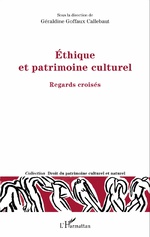I recently discovered on Nicholas O’Donnell’s Art Law Report blog that a new collection of essays has just been published by L’Harmattan in Paris on “Perspectives on Ethics and Cultural Heritage” (Ethique et Patrimoine Culturel: Regards Croisés). These are the proceedings of a conference held on October 20 and 21, 2015, at L’Ecole du Louvre in Paris. Almost all the contents are in French, with a few contributions in English. I’d be delighted to translate this if an American publisher would like to bring out an English version, or if any scholars or lawyers would like to commission a translation of a specific article.
This interdisciplinary conference covered many very interesting topics, including “artification” (treating non-art objects as art), the expanding category of cultural heritage, including intangible cultural heritage, the restitution of looted art, human remains as cultural heritage, digitization, and museum deaccessioning. The focus was on what kind of ethical guidelines do or should exist in this changing landscape.
Here’s the translated table of contents:
THE ETHICAL ISSUES OF CULTURAL HERITAGE DESIGNATION I
Introduction: Ethical Issues in Cultural Heritage
- The Perspective of UNESCO, Edouard Planche
- The Perspective of a Legal Expert, Stéphane Duroy
Ethics and “Artification”
- Ethical Issues in Artification, Nathalie Heinich
- Outsider Art, Ethics, and Law: Confiscating Authority?, Baptiste Brun
- The Auction Market and the Idea of Ethics: Normative and Behavioral Ethics, Catherine Chadelat
- Codes of Ethics in England: Between Flexible Law and Hard Law, Sophie Vigneron
THE ETHICAL ISSUES OF CULTURAL HERITAGE DESIGNATION II
Ethics and Designating Documents as Part of Cultural Heritage
- Ethics and Designating Documents as Part of Cultural Heritage, Dominique Jarrassé
- Making Architects’ Archives Part of Cultural Heritage, Gilles Ragot
Ethics and Designating Cultural Practices as Heritage (Intangible Heritage)
- The Protection of Intangible Heritage and the Ethics Test, François Julien-Laferrière
- Addressing the Ethical Challenges of Safeguarding Intangible Cultural Heritage, Janet Blake (published in English)
Ethics and Patronage
- Ethics and the Practice of Patronage, Philippe-Henri Dutheil
- Legal Tools for the Ethics of Patronage, Géraldine Goffaux Callebaut
THE ETHICAL ISSUES OF CONSERVATION
The Ethics of Restoration
- Ethics and Restoration: The Collection of Sculptures in Berlin and the Post-1945 Period, Julien Chapuis
- The Ethics of Restoration of Human Remains Considered as Heritage, Noëlle Timbart
Ethics and Digitization
- The Ethical Issues of Digitization (Sorting, Selection, and Censorship), Céline Castets-Renard
- Ethics and Digitization: The Ethical Issues of Digital Distribution, Emmanuel Bermès
- Digitization, Culture, and Law: The Digital Leap in the North American Sandbox, Vincent Gautrais and Christiano Therrien (published in English)
ETHICAL ISSUES IN RESTITUTION
Ethics and Restitution of Looted Artworks
- Ethical Issues in the Restitution of Looted Artworks, Astrid Müller-Katzenburg
- “Woman in Profile Before the Fireplace” by Henri Matisse from the Collection of Paul Rosenberg in the Upheaval of the Second World War, Emmanuelle Polack
Ethics and Restitution of Human Remains
- Collections of Human Remains: Ethical Stakes in Restitution and Valorizing Elements in Collections, Michel Van Praët
- The Ethics of International Law in the Restitution of Human Remains, Vincent Négri
Ethics and Deaccessioning
- Public Trust or Private Business? Deaccessioning Law and Ethics in the United States, Nicholas M. O’Donnell (published in English)
- Ethics and Deaccessioning, Marie Cornu
TWO-PART CONCLUSION
- Concluding Ideas from a Legal Expert, Jérôme Fromageau
- Conclusion from an Art Historian, Claire Barbillon

